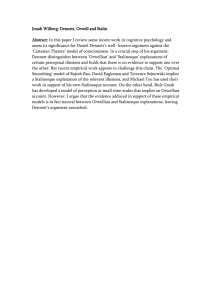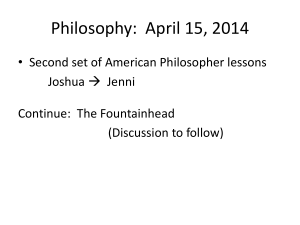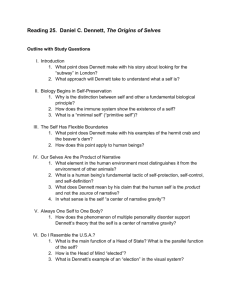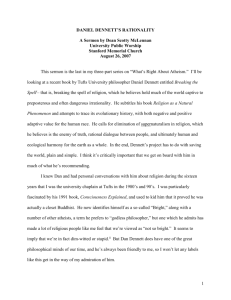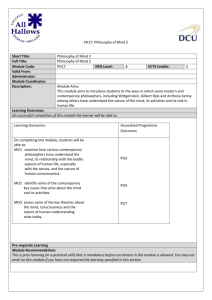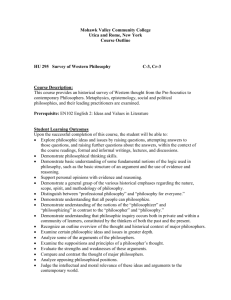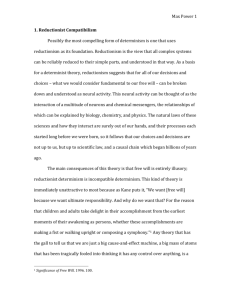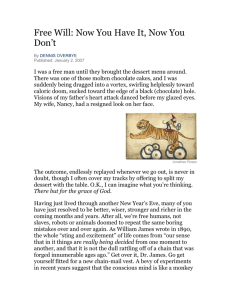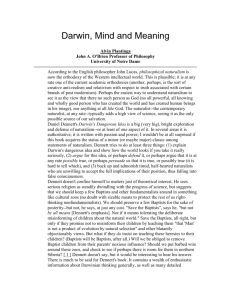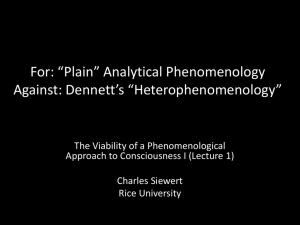Reading Outline - NAU jan.ucc.nau.edu web server
advertisement
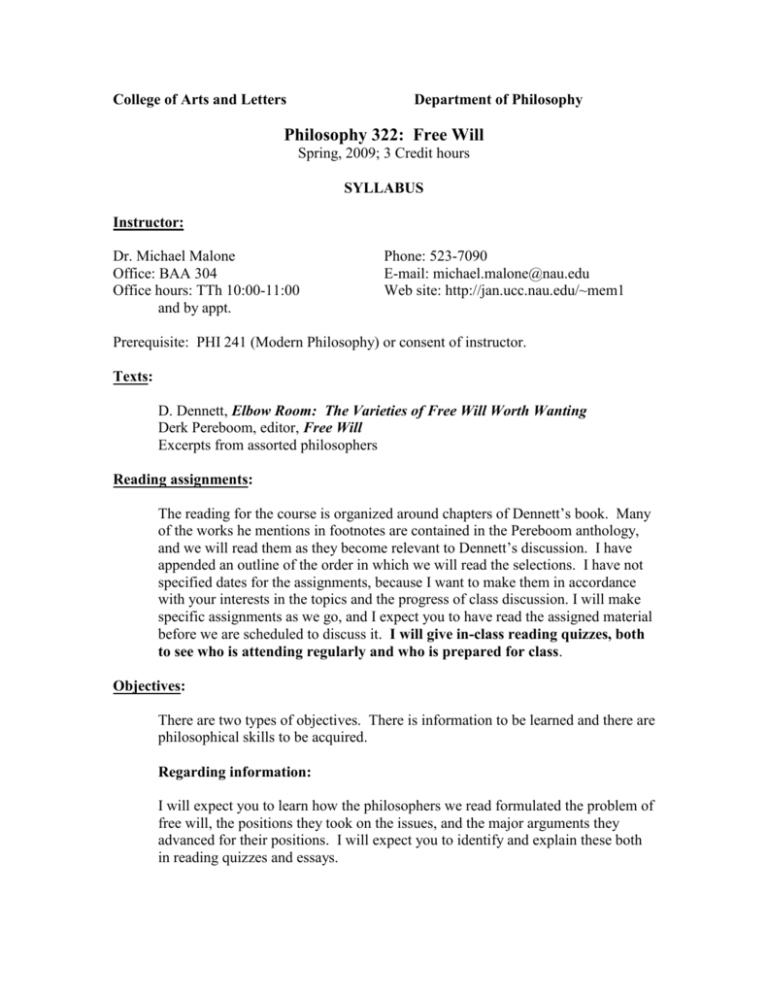
College of Arts and Letters Department of Philosophy Philosophy 322: Free Will Spring, 2009; 3 Credit hours SYLLABUS Instructor: Dr. Michael Malone Office: BAA 304 Office hours: TTh 10:00-11:00 and by appt. Phone: 523-7090 E-mail: michael.malone@nau.edu Web site: http://jan.ucc.nau.edu/~mem1 Prerequisite: PHI 241 (Modern Philosophy) or consent of instructor. Texts: D. Dennett, Elbow Room: The Varieties of Free Will Worth Wanting Derk Pereboom, editor, Free Will Excerpts from assorted philosophers Reading assignments: The reading for the course is organized around chapters of Dennett’s book. Many of the works he mentions in footnotes are contained in the Pereboom anthology, and we will read them as they become relevant to Dennett’s discussion. I have appended an outline of the order in which we will read the selections. I have not specified dates for the assignments, because I want to make them in accordance with your interests in the topics and the progress of class discussion. I will make specific assignments as we go, and I expect you to have read the assigned material before we are scheduled to discuss it. I will give in-class reading quizzes, both to see who is attending regularly and who is prepared for class. Objectives: There are two types of objectives. There is information to be learned and there are philosophical skills to be acquired. Regarding information: I will expect you to learn how the philosophers we read formulated the problem of free will, the positions they took on the issues, and the major arguments they advanced for their positions. I will expect you to identify and explain these both in reading quizzes and essays. Regarding philosophical skills: Class lectures and discussions will focus on discovering how an author views the issue of free will, on summarizing the position the author takes and, primarily, on extracting the major arguments the author offers in support of his or her view. I will expect you to be able to summarize an argument, and to develop a line of criticism of the argument that would force the author to rethink or defend the original argument. You will be asked to demonstrate these skills primarily in your essays rather than in reading quizzes. Written Assignments and Grades: I will give frequent in-class reading quizzes, graded on a 10-point scale and the average of the quizzes will be worth 25% of your final grade. There will be no opportunity to rewrite a reading quiz or to make up one you miss. I will assign three short papers (4-6 pages, double-space). Each of them will require that you summarize one or more of the views of thinker(s) we are reading at the time. But each of them will also require that you engage in philosophical reflection on these views. So, in order to get a good grade you must do two things. You must be able to summarize the views of the philosopher clearly and accurately, and you must be able to formulate a reasonable line of criticism and express and defend it clearly. I will grade these papers on a 100-point scale, and each paper will be worth 25% of your final grade. The last paper will be due at the time scheduled for the final exam. There will be no other final. The other papers will be assigned at equal intervals, as we are ready to do them. About the Course: Daniel Dennett, who authored the text around which I have organized the course, invented the expression "intuition pump.” He means by it an expression or theme which fuels our imagination--gets us thinking. At times he seems to say that it is philosophy's business to create these intuition pumps. At other times, though, he writes as if the effect of inventing intuition pumps is to saddle us with insurmountable, but also unnecessary, perplexities. Nowhere in contemporary philosophy have these intuition pumps created more confusion than in discussions of whether and when human beings are free, and responsible for their conduct. On the one hand, based on few successful demonstrations, there are the grandiose claims of experimental psychologists that our conduct amounts to so many instances of conditioning, the sensational claims by sociobiologists that we are controlled by our genes, and the rejoinder by sociologists that crime is caused by poverty and discrimination, for which the perpetrators of crimes are not responsible. Philosophers themselves sometimes claim that belief in human agency is metaphysical baggage of a bygone age. On the other hand, though, morality, the law, religion and our parents and peers all presuppose that we are capable of being responsible for our conduct, and hence that we can act freely. As if these rival claims were not perplexing enough, most of the philosophers who have discussed the issue have claimed that we can have our cake and eat it too: being free is not incompatible with being determined. Surely there are enough puzzles and confusions here to last us a semester. Dennett's book, Elbow Room: The Varieties of Free Will Worth Wanting, merits our attention for several reasons. He is a clever and entertaining writer: You should enjoy reading him. He is a leading figure in contemporary American and British philosophy of mind: most philosophers think that his views are worth their attention, even if they disagree with him. To my way of thinking, he gets enough right that I feel comfortable defending him--at least up to a point. And, again to my way of thinking, he is confused about enough that I can defend some of my own beliefs on the subject as I try to show where he goes wrong. As we read Dennett we will examine writings of great and famous philosophers, historical and contemporary. They will give us a sense for how the problem of free will arises historically, as well as for how the dialog would go between Dennett and other contemporary philosophers. I cannot resist adding to these introductory remarks an anecdote. The first time I offered this course, during the early registration period I ran into a friend from another department at a local restaurant. With an embarrassed look on his face (the look of someone who feels a little uncomfortable being seen in public with someone else), he said, "I noticed that you are teaching a course called "Free Will." What could you possibly do in there?" The implication, or so it seemed, was that we all (or at least all of us educated people) know that we are determined and that the idea of free will is a metaphysical confusion. I replied that I’d have to wait and see what my genes, my environment or my society caused me to do. At that point my friend admitted, sheepishly, that while he and his colleagues require their students to read materials that espouse determinism, none of them believed in it. (Do you suppose that his students know that?) Our task, of course, is neither to espouse or reject either the idea of freedom or determinism, but to understand how thinkers have conceived of ideas such as freedom, will, causation, and responsibility, and what has led them either to embrace or reject the idea of freedom. Attendance: To pass this course, you must attend regularly. More than three absences during the semester will adversely affect your grade. Academic Honesty: Not only is it appropriate to study together, I encourage you to do it. But anything you turn in for a grade must be your own work. Should I discover that you have submitted something that is not your own work, you will receive a failing grade for the course. Reading Outline Unit One – Preliminaries Pereboom, Introduction, pp. vii-x – The possibilities The Stoics and Lucretius – Pereboom, pp. 5-18 Plato and St. Augustine – Pereboom, pp. 19-33 Dennett, Chapter 1, section 1, pp. ix-7 – The “Perennial Gripping Problem” Unit Two – The Bugbears, Bogeymen and Intuition Pumps Dennett, Ch. 1, sections 2-4, pp. 7-19 Unit Three – Practical Reason David Hume, A Treatise of Human Nature, pp. 57-67, and An Enquiry Concerning Human Understanding pp. 68-85 Immanuel Kant, Critique of Pure Reason, pp. 86-101 Dennett, Ch. 2 – Making Reason Practical, pp. 20-49 P. F. Strawson, “Freedom and Resentment,” in Pereboom, pp. 119-142 Unit Four – Control and Self Control Peter van Inwagen, “The Incompatibility of Freedom and Determinism,” in Pereboom, pp. 184-198 John Martin Fischer, “Responsiveness and Moral Responsibility,” in Pereboom, pp. 214-241 A. J. Ayer, “Freedom and Necessity,” in Pereboom, pp. 110-118 Dennett, Ch, 3 – Control and Self Control, pp. 50-73 Unit Five – Freedom and the Self Aristotle, Nichomachean Ethics, in Pereboom, pp. 1-4 Roderick Chisolm, “Human Freedom and the Self,” in Pereboom, pp. 143-155 Harry Frankfurt, “Alternate Possibilities and Moral Responsibility,” and “Freedom of the Will and the Concept of a Person,” in Pereboom, pp. 156183 Dennett, Ch. 4 – Self-Made Selves, pp. 74-100 Unit Six – Contemporary determinists Reviews of a contemporary book by a sociobiologist A short essay by B. F. Skinner Unit Seven – The Rest of Dennett’s Story Dennett, Chs. 5 – 7, pp. 101-170
